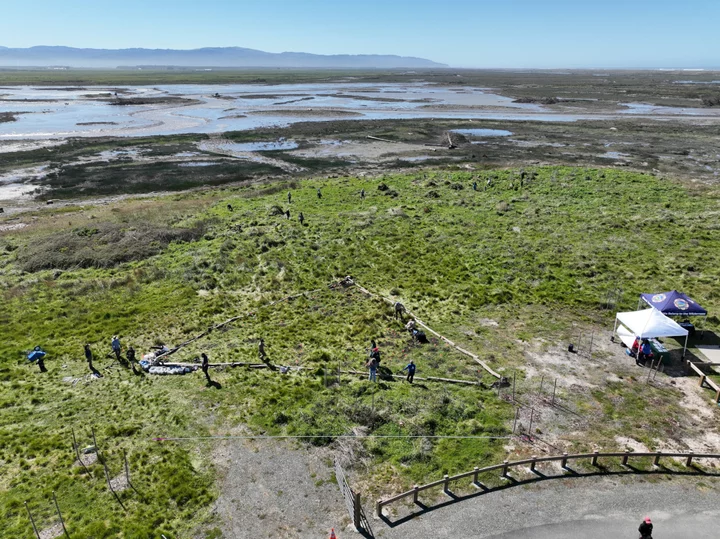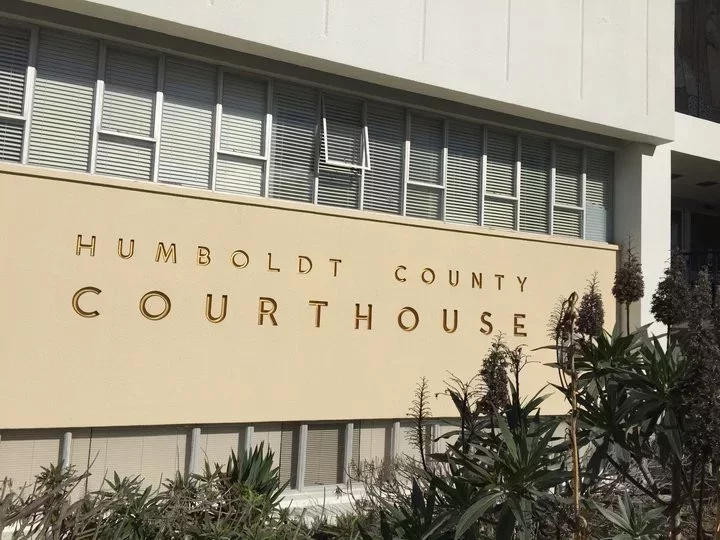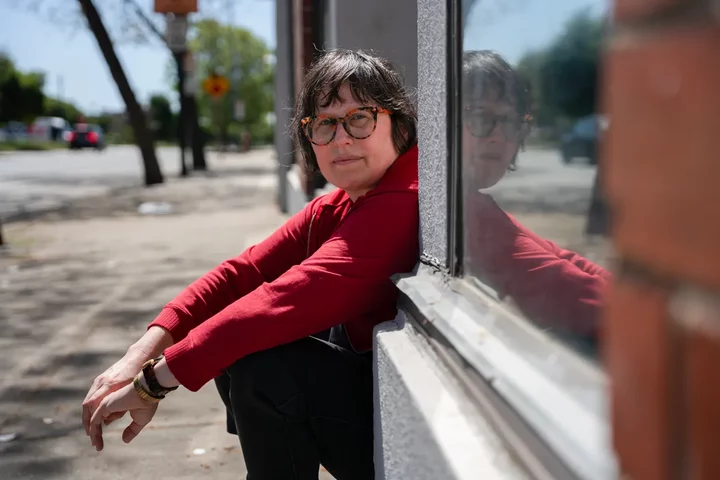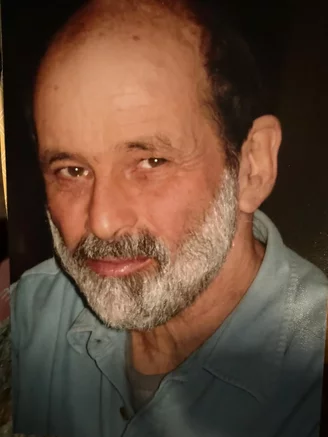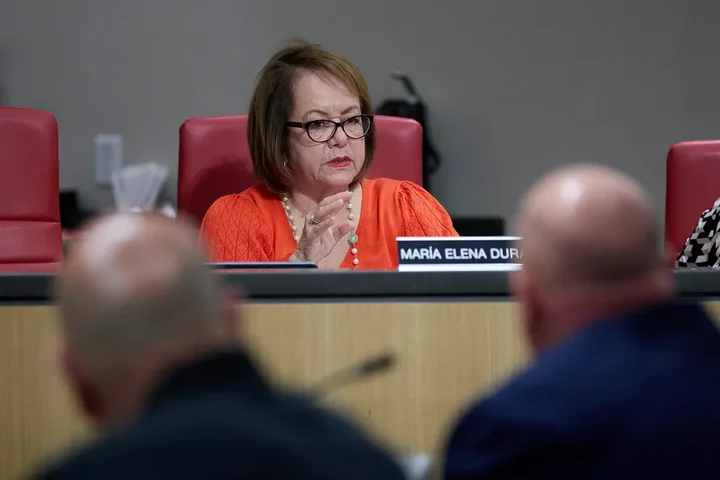(PHOTOS) CalTrout Held a Photo Contest to Celebrate the Eel River, and Here Are Your Winning Entries
LoCO Staff / Thursday, May 1, 2025 @ 12:23 p.m. / Art , Environment
From CalTrout:
This year marks a major milestone for the Eel River watershed, as Phase 2 of the Eel River Restoration and Conservation Program kicks off and the Potter Valley Project (including two dams) nears decommissioning. To commemorate this epic year of watershed renewal, California Trout was thrilled to present the Eel River Photo Contest in collaboration with the Rotary Club of Eureka! The winning photos beautifully showcase the watershed through the lenses of access, restoration, wildlife, and recreation. The Emerging Photographer winner and Best Photo winners were selected by a panel of CalTrout staff. The Grand Prize award was selected by public vote at the Eel River Expo on April 19, 2025.
Best Photo (Wildlife) and Grand Prize Award Winner
Title: Slick Mama & Pup Otter
Photographer: Talia Rose
Location: South Fork Eel River
Best Photo (Access)
Title: Dos Rios
Photographer: Nikki Whipple
Location: Highway 162
Best Photo (Restoration)
Title: Watershed Awareness Volunteer Event at Ocean Ranch Unit
Photographer: Wiyot Tribe Natural Resources Department
Location: Ocean Ranch Unit, Eel River Estuary
Best Photo (Recreation)
Title: Red Sky at Night – Angler’s Delight
Photographer: Phil Reedy
Location: South of Smith Redwoods State Reserve
Emerging Photographer Award
Title: Liquid Gold
Photographer: Barbara Larrondo-Soto
Location: Sproul Creek
BOOKED
Today: 9 felonies, 10 misdemeanors, 0 infractions
JUDGED
Humboldt County Superior Court Calendar: Yesterday
CHP REPORTS
5559 Mm101 S Men 55.60 (HM office): Hit and Run No Injuries
ELSEWHERE
Governor’s Office: Munich Security Conference: Governor Newsom reinforces climate partnerships as Donald Trump abandons long-standing American allies
Governor’s Office: Governor Newsom, German Environment Minister pledge further climate and environment cooperation at Munich Security Conference
Times-Standard : Photo | Last-minute flower shopping
Times-Standard : Ordinance to prevent offshore oil work on harbor district land discussed
Want to Investigate Local Government? The Humboldt County Civil Grand Jury Needs More Jurors for Its Upcoming Term
LoCO Staff / Thursday, May 1, 2025 @ 10:14 a.m. / Courts
Photo: Andrew Goff
###
Press release from the Humboldt County Civil Grand Jury:
The Superior Court of California, County of Humboldt is requesting that the public submit more applications for the 2025/2026 Humboldt County Civil Grand Jury (term of July 1st -June 30th). The Humboldt Superior Court empanels 19 citizens to act as an independent body of the judicial system each fiscal year. The Court accepts applications from citizens representing a broad cross-section of the Humboldt County community. The Civil Grand Jury is currently meeting in-person one day a week and via Zoom one day a week (their weekly meeting schedule and time commitment may vary from 10-30 hours). PLEASE APPLY AND HELP SERVE YOUR LOCAL COMMUNITY’S INTERESTS.
The primary work of the civil grand jury is to investigate and review citizen complaints concerning the operations of city and county government as well as other tax supported and non-profit agencies and districts. Based on these reviews, the grand jury publishes its findings and may recommend constructive action to improve the quality and effectiveness of local government. The civil grand jury’s role excludes the consideration of criminal indictments.
Eligibility requirements for grand jury service are:
- Citizen of the United States, 18 years or older;
Resident of Humboldt County for at least one year before selection;- In possession of natural faculties, of ordinary intelligence, of sound judgment and fair character;
- Sufficient knowledge of the English language;
- Not currently serving as a trial juror in any court in this state;
- Have not been discharged as a grand juror in any court of this state within one year;
- Have not been convicted of malfeasance in office or other high crime;
- Not serving as an elected public officer.
For more information and to learn more about the application process, please visit the Court’s web site: https://www.humboldt.courts.ca.gov/general-information/jury-services/civil-grand-jury.
The application can be found using the QR code above or be filled out and submitted at: https://cty-lf-web.co.humboldt.ca.us/Forms/grandjuryapps.
Thank you for your interest in your community!
Emergency Personnel Search for Missing Infant After 299 Crash Near Big Flat
LoCO Staff / Thursday, May 1, 2025 @ 9:31 a.m. / Emergency
Press release from California Highway Patrol:
On May 1, 2025, at approximately 0135 hours, a single-vehicle collision occurred on SR-299, two miles east of Big Flat in Trinity County. The driver was traveling eastbound on SR-299, at an unknown speed, when the vehicle traveled off the road, down an embankment, and into the Trinity River where it became submerged. The driver and adult passenger sustained minor to moderate injuries and were taken to Trinity General Hospital. A search is still underway for the child. Neither alcohol or drugs were a factor in this collision. The cause of the collision remains under investigation by the Trinity River Area CHP.
They Found Their Homeless Loved Ones After Years Apart. But That Was Just the Beginning.
Marisa Kendall / Thursday, May 1, 2025 @ 7:22 a.m. / Sacramento
Julie Crossman, sister of Nanie Crossman, in Oakland on April 8, 2025. After losing contact for six years, the sisters reunited after Julie saw that Nanie, who is unhoused, was quoted in a CalMatters article. Photo by Florence Middleton for CalMatters
###
This story was originally published by CalMatters. Sign up for their newsletters.
###
The last time Julie Crossman saw her little sister, Nanie Crossman, it was 2019 and Nanie was moving out of Julie’s San Francisco apartment, destination unknown.
For the next six years, Julie worried — especially every time it rained. She assumed Nanie was homeless, but she had no idea where she was or how to find her.
“I just couldn’t sleep at night because I was so scared,” Jule said, her voice breaking. “I was really scared that she was just, like, cold and alone.”
Then, in January, Julie got a text from her half-brother. It was a link to a CalMatters article about unhoused people voting. And it quoted Nanie.
That article launched Julie on a quest to find her long-lost sister, rekindle their relationship and — maybe — help her get off the street.
It’s estimated more than 187,000 Californians are homeless. But no one counts the number of people like Julie, who stay up late worrying, compulsively Googling their sister, father or child’s name for a clue to their whereabouts. The people who scan every face each time they pass a homeless encampment.
Their numbers are likely far greater.
Some nonprofits that work in the homeless services sector say reconnecting with family is a crucial, and often overlooked, step in getting clients off the street. Even if a family member can’t offer up their guest room or couch, they might help their loved one find housing, access addiction treatment, sign up for benefits, or simply provide emotional support — reminding them that they are important and worthy of love. But the process of finding and reconnecting with someone living outside can be difficult, both logistically and emotionally, for everyone involved.
Once the person is found, it opens up a new question: What, if anything, can be done to help? The answer is almost never simple. Despite a growing effort by homeless service providers to reunite clients with their families, there’s little data to show how often those reunifications end someone’s homelessness.
And, as Julie found when she searched for guidance, few resources exist to help families navigate this terrain.
“I haven’t found anything,” Julie said. “It’s frustrating because this whole thing is happenstance and coincidence and lucky breaks but there’s not really a road map that I can find of other people’s methods, or things they’ve done that have been helpful.”
Two sisters reunite
From the CalMatters article, Julie gleaned one important fact: Nanie was living in an RV parked on a West Oakland street. It felt like a lucky break – Julie had since moved to Oakland as well. She emailed the CalMatters reporter to find out more.
Three weeks later, on a sunny Tuesday morning, she and the reporter stood outside a row of RVs on a trash-strewn side street next to a graffiti-covered warehouse wall. It had taken a few tries to get there. Police had forced Nanie to move from her prior parking spot a week and a half earlier, so Julie and the reporter walked up and down the nearby streets, asking other RV-dwellers if they knew her.
Eventually, they found an RV that had Nanie’s name sketched near the door. Julie was scared. She worried Nanie wouldn’t want to talk to her after all these years.
They knocked — no answer. Nanie wasn’t in her RV. But they soon found her in the RV next door.
“Julie!” Nanie exclaimed, stepping outside. The sisters threw their arms around each other in a tight hug.
“What’s up, dude?” Nanie asked when they separated, as if it hadn’t been six years.
“Nothing is up,” Julie replied, beaming. The resemblance between the two sisters, now both in their 40s, was obvious: Matching dark hair, pale complexions and smiles.


From left to right, sisters Julie Crossman and Nanie Crossman reunite outside of Nanie’s trailer in West Oakland, after going six years with no contact, on April 1, 2025. Photo by Marisa Kendall, CalMatters
Julie and Nanie immediately launched into a remarkably ordinary conversation, updating each other on their lives. They discovered they both have cats. Neither has a driver’s license. Nanie described what it was like being homeless in San Francisco during the COVID-19 pandemic (she liked having the streets to herself) and talked about the time she spent living in Sacramento. Julie wanted to know about the logistical details of her sister’s life: How do you get clothes? What about food?
They kept it light. They didn’t unpack old traumas or air past grievances. Julie didn’t ask Nanie if she was using drugs or badger her about getting a job and moving inside.
Later, Julie said it took some willpower to tamp down her protective, older-sister instincts.
“I don’t want to judge her life where it’s just a fact of life. I just don’t think that’s a good way to approach it,” Julie said. “If it were me, I would just shut down. I would not want to talk to someone like that, who was asking me that kind of question.”
Julie presented Nanie with the offerings she brought: A few cans of sparkling water, wet wipes, socks and a fancy pen. She offered to do Nanie’s laundry.
“Nanie, I’m so glad to see you,” Julie said with a squeal, giving her sister another hug. “I feel like we’re just chit-chatting.”
‘It’s tougher than I even imagined’
Julie and Nanie were close as kids growing up in Boston’s Beacon Hill neighborhood. They invented games, such as using a Barbie boombox to record themselves reading children’s books in funny voices. As they got older, their conversations were so full of inside references that outsiders, including one of Julie’s former boyfriends, were left in the dark.
Nanie told a CalMatters reporter that after she became homeless, she avoided trying to find Julie. She was afraid her sister would be mad at her or judgmental — or worse, that she’d died in an accident and Nanie hadn’t known. Seeing her again was a big relief.
“I feel a lot less all alone out here,” Nanie said.
Julie walked away from their meeting with mixed emotions. She was relieved that overall, Nanie seemed OK. The fears she had — that Nanie might have physically or mentally deteriorated due to drugs, or been forced to do sex work to survive — seemed unfounded. Nanie was safe from the elements in her RV and had a community of friends.

Julie Crossman, sister of Nanie Crossman, in Oakland on April 8, 2025. After losing contact for six years, the sisters reunited after Julie saw that Nanie, who is unhoused, was quoted in a CalMatters article. Photo by Florence Middleton for CalMatters
But the meeting also raised a big question: What could Julie do to help her sister?
Nanie says she wants a relationship, not help. In the past, after moving indoors, she became depressed. In her RV, within her street community, she feels like herself.
“For now,” Nanie said, “I’m content out here. And I guess what I want from her is to understand that.”
Julie understands that as well as someone who hasn’t lived on the streets can — which is to say, not completely. She still wants to help, but she’s struggling with how. Part of her wants to open up her home so Nanie can shower, do laundry and hang out, while another part of her thinks she should instead set boundaries.
And then she feels guilty for even considering keeping her sister at a distance.
“It’s tougher than I even imagined it would be,” Julie said.
Does reconnecting with family help?
Programs throughout the state offer bus tickets out of town to unhoused people trying to reunite with family or friends. That can result in people simply becoming homeless again in a new location. But proponents say that if done with the proper support, sending someone back into the arms of loved ones can be a lifesaver.
“We heal in community,” said Gabby Cordell, who runs the reunification program at the San Francisco-based nonprofit Miracle Messages. “We’re not meant to go through life alone. And everyone matters. Everyone is someone’s somebody.”
Using Google, social media and anything else they can think of, Miracle Messages helps unhoused clients find their mothers, fathers, brothers, sisters, or anyone else they are looking for.
The organization receives about 50 referrals a month — mostly for cases within California, Cordell said. She and her team are able to find and get a hold of the person they’re looking for about half of the time. Sometimes, the family member is thrilled.
“It’s astounding how often we get an, ‘Oh my gosh, I’ve been looking for him,’” she said.
Other times, the relationship has been badly damaged, and the family member isn’t interested in reconnecting.
The group also offers the reverse, helping people who are housed find loved ones living on the street. That’s much harder, Cordell said.
“Trying to find your brother is looking for a needle in a haystack,” she said. “Trying to find your brother who is unhoused is looking for a moving needle in 10 haystacks.”
The nonprofit has succeeded in arranging more than 115 of these more difficult reunions since around 2017, according to its website.
Nonprofit LifeMoves also offers reunification services across 17 of its homeless shelter and temporary housing sites in Silicon Valley. Only a small percentage of clients leave homelessness that way (the nonprofit doesn’t track exactly how many), said Heather Griffin, director of shelter and services for Santa Clara County.
It’s impossible to know how successful these efforts are. Neither LifeMoves nor Miracle Messages tracks what happens to people after they reunite with family.
‘That was hard:’ Another family reconnects after decades on the street
Ashanti Terrell lived a lot of her life without her father, Ashby Dancy.
He was on and off the streets of Oakland for most of her childhood, while she grew up in and out of foster care and then with her mother’s family. She lost touch with him as the years passed and she earned a master’s degree, launched a career in public safety and had three children of her own in Atlanta.
But as she got older, she felt a void. Her mother had died and her father was all she had left.
“When I was 18 years old, (I) graduated, I had nobody to go to my graduation,” Terrell said. “I wanted my dad to at least be at my graduation. I haven’t gotten married because I wanted my dad to be there, you know. I haven’t done a lot of stuff because I wanted my dad.”
Terrell had glimpses of her father over the years. Two years ago, he landed in subsidized housing in Oakland and she went to visit him. But he didn’t know who she was, she said. Whether that was because of drug use, mental illness or both, she wasn’t sure.
Last fall, Terrell got a call from a social worker. The social worker said her father was trying to get to Atlanta to see her, but got stuck in Texas and ended up in a hospital. Terrell started planning with her sister to help him. But when she called the hospital again, he was already gone. No one knew where.
She decided to pack up her life in Georgia, move to the Bay Area, and find him.
Then, while Googling her father’s name, Terrell saw him quoted in an October CalMatters article — coincidentally, the same article that helped reunite Julie and Nanie Crossman. The article said he was at a tent encampment in East Oakland.

Ashanti Terrell and her son Mekhi Terrell stand outside her father’s tent in Oakland on April 18, 2025. Photo by Jungho Kim for CalMatters


First: Ashby Dancy talks with one of his daughters over FaceTime as his daughter Ashanti Terrell holds the phone and grandson Mekhi Terrell stands nearby. Last: From left, Ashby Dancy speaks with his daughter Ashanti Terrell in Oakland on April 18, 2025. Photos by Jungho Kim for CalMatters
Terrell went looking. She drove around the area at different times of day, hoping to catch a glimpse of her father. She asked the workers at a nearby Burger King if they’d seen him.
In March, Terrell emailed the CalMatters reporter for help. The reporter showed her where to find her father’s tarp-covered tent, sitting by itself on the sidewalk.
After that, Terrell started visiting her father, stopping by to check on him, talk and give him food.
On a recent Friday afternoon, she brought her 7-year-old son, Mekhi. Dancy gave the boy a fistbump and asked about his school, and about the family’s upcoming move to Oakland’s Temescal neighborhood. But then he started talking about the 22 kids he’d had with his ex-girlfriend (something Terrell is positive didn’t happen). He mumbled, making it hard for her to understand him.
Mekhi asked his mom if they could buy Grandpa some Burger King, and she said yes, promising to come back with a burger after they picked the other kids up from school.
“I just wanted to let you know that I’m here,” Terrell told her father, as they left. “As soon as I get myself together, I’m going to help you out.”
“I love you, sweetheart,” he said. And then to Mekhi: “Take care of your mom, OK?”
Terrell teared up as she and Mekhi walked away from her father’s tent. “That was hard,” she said.
He had admitted he was drunk, which disappointed her. Just like today’s Oakland — with its massive homeless encampment along East 12th Street — is unrecognizable as the city she grew up in, the man she just talked to is not the father who raised her. The father she remembers won trophies for boxing. He was a “big kid,” a gentle soul who ran around and played with her and her two sisters, did their hair in cute braids and took them camping.
“I don’t know who he is,” she said of the man in the tent. “I come from him, but I don’t know him.”

Ashby Dancy sits in a chair next to his tent while looking at his grandson Mekhi Terrell, whom he is meeting for the first time, in Oakland on April 18, 2025. Photo by Jungho Kim for CalMatters
The last real memory Terrell has of her father is from July 1998, at the same Burger King across the street from her father’s tent. It was Terrell’s 8th birthday. She was in foster care, but was visiting with her parents at the fast food chain — her favorite — to celebrate.
She moved with her mother to Chicago and then Atlanta shortly after, and lost touch with her father, who stayed behind in Oakland.
Now, Terrell wants to repair their relationship. She wants him to get to know his grandchildren, and she wants to take him to visit his 86-year-old mother in Stockton.
She also wants to save him, before it’s too late. He’s 63, and Terrell is scared that if he stays outside, he’ll fall victim to fentanyl, or one of the many other dangers of the street.
Terrell imagines helping her father will involve rehab and an assessment of his mental state — if he’s willing. She wants to figure out why he lost his subsidized housing, and if he can get it back. But she’s not sure where to start.
“Maybe 20 years might be too late,” she said. “I don’t know.”
OBITUARY: Aryay Kalaki, 1934-2025
LoCO Staff / Thursday, May 1, 2025 @ 6:56 a.m. / Obits
Aryay came to Humboldt County, like many others, to live out some of the visionary propositions
of the 1960s. He had so far been rewarded with beatings, arrests and a fat file in the offices of
the FBI. His photo had made the front page of the San Francisco paper when HUAC (the House
Unamerican Activities Committee) came to town hunting for commies and subversives. Sprayed
by fire hoses along with other protestors, cops dragged him feet first down the marble stairs of
city hall’s rotunda, hands jammed in the pockets of his corduroy jacket, looking like he was
exactly where he wanted to be.
Even as the child of a liberal and cultured Portland family-he began violin at an early age-he reacted badly to unreasoned authority. Sent to a pre-eminent eastern college, he left during his first year with an allergic reaction to the prevailing idea of order. Only after living a year with relatives in Berkeley, who introduced him to leftist living and found him a job driving a furniture truck — beautiful music and working class politics-did he begin to find his way to health and happiness.
He enrolled at UC Berkeley, studied history, and joined SLATE, the political group that preceded the Free Speech Movement, introducing politics to the “quiet generation” of 1950’s college students, around issues like racial discrimination-yes, in Berkeley!-as well as apartheid in South Africa, atomic bomb testing but also mandatory ROTC and the segregation of women at UC football games.
From college he went east again, working for the National Lawyers Guild as an organizer wherever his skills were needed — in the Jim Crow south, north again, then back to the west coast where he worked with the Farmworkers under Cesar Chavez, and with the Panthers in some of their early organizing around breakfasts for children and the armed defense of neighborhoods.
All these now-famous actions attracted increasing violence during the Vietnam years, from Nixon’s dirty tricksters to hard-hat goons, leather-wearing bikers, and from trigger-happy cops and national guardsmen. This repression created strong solidarity on the left, but it was also met with hardening dogma and an all too familiar authoritarianism.
It was time to move to the country.
Aryay began half a lifetime of work on an old house in Manila, he started an organic garden, supported himself by knife sharpening and carpentry-and he continued to be a political organizer wherever a social ill presented itself. In mid-century America, spraying toxic herbicides had become a chief tool of forest management, highway maintenance, and yard care, and it spoke personally to anyone with allergies. Aryay and his partner, Ann-Marie Martin, worked as co-chairs of Humboldt Herbicide Task Force, and under their leadership this practice-so widely accepted as to appear “normal,” never to be questioned-turned out to be deeply unpopular with a huge swath of the public, from Native basket weavers to nursing mothers, from health workers to farm workers. Organizing is never finished-many of these toxics are still permitted-but now in Humboldt County there are rules and regulations in place. You can still see the signs in front of rural houses: NO SPRAY.
A decade later, still in Manila, Aryay and a hand-picked group of activists began a campaign against off-road vehicles that were destroying its dunes and threatening the peace and safety of the community. Again, off-road driving was an accepted activity (Ronald Regan declared it a national form of recreation) affecting only some low-value hills of sand and a fewlow-income people. But organizing begins with asking questions and when people were queried at the mall and grocery stores, it was true that they didn’t care as deeply as they might about their poor neighbors and endangered wallflowers, but they really, really wanted dune buggies off their beaches. And when they formed a coalition, and held it together for years of protests and meetings, people got their property, their personal safety, and their beaches back.
These contributions to community well-being, and many others, smaller and quieter, were never Aryay’s end goal, not what he was most proud of. When he was in hospice and wrote his own brief obit, he mentioned none of that. It was his home repair, small jobs for people of modest means-he’d place an ad in Senior News-along with his organic gardening, and especially his composting that he listed among his chief accomplishments. In musical quartets and on remodel jobs, while bowling and engaged in friendships were his greatest pleasures, most especially with long-time companion and wife,Marcia Brenta and her two children, Amelia Hughes and Mario Brown. Aryay celebrated community in their home in Bayside, honoring day of the dead and solstice for many years. He embraced excursions to Breitenbush,Oregon and Rubio, Smith River for process and rejuvenation. Aryays loud gutfaw-hawl when something struck his funny bone, was a reminder of his delight in good company.
But when he saw the need for change in our lives, he was on us. From our most private moments-to his last breaths he argued for the efficacy of the compost toilet-to the most dire challenges of sea level rise, he was organizing us like lost sheep. In his final days in hospice, his letter to the editor appeared in the Mad River Union.
“The people who survive the coming changes and challenges will have to live closer to the Earth, from [off] the Earth, and with each other.” Like a good organizer, he told those people (maybe you) to ask questions: “Questions about what of the industrial culture can be salvaged, and for how long, will be important to ask.”
Thanks, Aryay. You will be missed.Our VERBEENA. Aryay will be remembered by many family and friends in Portland, Humboldt, Berkeley, San Anselmo and Santa Rosa.
Celebration of life will be held at the Humboldt Unitarian Fellowship
24 Fellowship Way, Bayside, CA 95524
June 7th
5-8 pm
RSVP
707-601-4687
###
The obituary above was submitted on behalf of Aryay Kalaki’s loved ones. The Lost Coast Outpost runs obituaries of Humboldt County residents at no charge. See guidelines here. Email news@lostcoastoutpost.com.
OBITUARY: Edward Albert Waterman, 1953-2025
LoCO Staff / Thursday, May 1, 2025 @ 6:56 a.m. / Obits
Edward Albert Waterman
March 10, 1953 - March 8, 2025
Edward Albert “Ed” Waterman, 71, of McKinleyville, passed away suddenly on March 8, 2025, just two days shy of his 72nd birthday.
Born in Bakersfield to James and Mary Waterman, Ed graduated from East Bakersfield High School in 1971. After high school, Ed proudly served his country in the United States Navy as an Aircrewman, working as an Anti-Submarine Warfare Operator until he was honorably discharged in 1976, earning a National Defense Service Medal. Following his military service, Ed pursued his passion for architecture at California Polytechnic State University, San Luis Obispo, where he graduated in 1980 with a Bachelor of Science in Architecture. Starting as a draftsman, he eventually became a licensed architect in Bakersfield, embarking on a distinguished 44-year career and focusing on the diversity of buildings and restoration. Ed’s parents were pillars in the Kern County education system. This strong sense of community instilled in Ed influenced his commitment to projects with the Bakersfield City School District, contributing to new builds, remodels, and modernization. Ed’s career diversity also took him to the East Coast, where he worked in Athens, Georgia, for Clark County, Heery International, and Motorola Inc.
Ed’s love for his family was evident in every aspect of his life. He and his future wife Maria, who attended the same high school, were brought together by fate at Raintree Health Gym in February 1984. They married on May 1, 1987, and Ed lovingly embraced the role of stepfather to Maria’s two sons, Desi and Damian. He dedicated himself to enriching their lives, introducing them to camping at Montana De Oro, fishing at Stony Creek, hiking the Sequoia National Forest, skiing at Sierra Summit, and the literary worlds of J.R.R. Tolkien.
Ed was a devoted family man who took immense pride in his role as grandfather. He never missed his granddaughter Rebeca’s dance performances or his grandson Kainoa’s soccer and basketball games. His love for his family remained unwavering until his final moments.
In 2001, Ed briefly took a break from his job in architecture and was trained to be a commercial truck driver. Shortly after, Maria joined him, and they became a team at Covenant Transport, working as long-haul drivers. This opportunity allowed Ed and Maria to see parts of the United States they had never imagined traveling to. Ed’s love for cooking reflected his warm and hospitable nature. He often entertained and prepared extravagant meals for friends and family, including his legendary “Eddie’s Spaghetti.” Usually working on projects around his house, Ed enjoyed his weekend trips to the hardware store. His joy in cuddling on the couch with Maria and their dog, Tuffy, while binge-watching their favorite show or enjoying a Georgia Bulldogs football game was part of his loving and caring personality.Upon retirement, Ed and Maria relocated to Humboldt County to be closer to family. Still, Ed’s passion for his profession and civil service soon led him to join the Humboldt County Department of Public Works as a Construction Projects Manager.
At the time of his passing, Ed was looking forward to his upcoming retirement and had enthusiastically planned numerous projects, including building a new chicken coop, restoring his vegetable garden, and visiting friends across the country. Ed was preceded in death by his parents, James and Mary Waterman. Ed is survived by his loving wife Maria, stepsons Desi Vega and Damian Vega, grandchildren Rebeca Vega and Kainoa Vega, brother David Waterman (Marsha), sister Karen Velgouth (Norman), Sister-in-law Elvira Zavala-Patton, numerous nephews, nieces, and family too large to mention as well as friends and colleagues whose lives were touched by his kindness, integrity, and dedication.
Ed’s commitment to service was a testament to his dedication and selflessness. He served his country, his profession, his community, and above all, his family with unwavering commitment. His legacy of love, craftsmanship, and adventure will continue to inspire all who knew him.
###
The obituary above was submitted on behalf of Ed Waterman’s loved ones. The Lost Coast Outpost runs obituaries of Humboldt County residents at no charge. See guidelines here. Email news@lostcoastoutpost.com.
Unprecedented Vote Shows Dems Fractured Over Housing Policy
Ben Christopher / Wednesday, April 30, 2025 @ 3:21 p.m. / Sacramento
State Sen. Maria Elena Durazo during the Senate Committee on Health at the Capitol Annex Swing Space in Sacramento on April 9, 2025. Photo by Fred Greaves for CalMatters
###
This story was originally published by CalMatters. Sign up for their newsletters.
###
One of the most controversial housing bills of the year has lived to be voted upon another day, but only by surviving the Legislative equivalent of two back-to-back prison breaks.
Last week, Senate Bill 79, a bill by San Francisco Democratic Sen. Scott Wiener to boost apartment and commercial construction around major public transportation hubs, passed the Senate Housing Committee over the strenuous objections of its chair, Sen. Aisha Wahab, a fellow Democrat from Fremont.
That was a notable development in its own right. Committee chairs tend to get their way on the bills that pass through their committees. When a majority of a committee’s members decide to buck Legislative decorum and tradition and steamroll that committee’s chair, it’s often taken as a sign that California’s dominant Democrats are unusually divided over an issue; that the issue at hand is especially contentious; that the legislators either aren’t receiving clear guidance from Legislative leadership or are willing to ignore that advice; or some combination of all of the above.
Fast forward to this week and it happened again.
In the Senate Local Government Committee, Sen. María Elena Durazo, a Los Angeles Democrat, urged a no vote on Wiener’s bill.
She didn’t get her way. The bill passed with the backing of all the other Democrats on the committee. Durazo voted “no” with the two Republicans.
A chair getting “rolled” is an unusual spectacle in Sacramento. In the typically arcane and perfunctory proceedings of the Legislature, this bit of human drama pops up once or twice a year. For it to happen twice in a row for the same bill is without any obvious precedent.
“Extra unique” is how Chris Micheli, a longtime California lobbyist and public commentator on the Legislative process, described the situation. “Beyond the particular bill at hand, it could give an indication that there is a philosophical split in the caucus.”
So far Senate President Pro Tem Mike McGuire, a Santa Rosa Democrat, has refused to comment publicly on where he stands on the divide within his caucus, whether the two chairs speak for him and whether he plans to intervene to smooth things over.
For some advocates, the silence from McGuire has been deafening.
“The Assembly seems to recognize the urgency of this moment and Governor Newsom has routinely signed with great enthusiasm even the most difficult housing bills to reach his desk, but the Senate appears more isolated from the rest of California on housing than it has in recent years,” Jim Wunderman, president of the Bay Area Council, which co-sponsored SB 79, wrote to McGuire late last week. “As ‘one of our own,’ a member of the Bay Area Caucus, and President Pro Tem of the Senate we feel compelled to write to you to share our deepening concern that the progress that we need on housing may ultimately stall in the Senate.”
McGuire’s office did not respond to a request for interview before this story was published.
After the caucus, Wiener downplayed the idea that there are irreparable divisions within the caucus.
“You have two chairs who have just a different perspective and that’s normal and, you know, I appreciate that we’ve been able to go through this process very respectfully,” he said. “We’re all grown ups.”
As for McGuire: “He’ll weigh in when he needs to weigh in,” said Wiener.
McGuire is termed out of the Legislature next year, an expiration date which may limit his influence.
The increasingly public philosophical split within the Democratic caucus was apparent in both committee hearings. Wiener is a prolific housing legislator whose views align with the broader “Yes In My Backyard” movement which sees California’s housing affordability crisis as the product of an overall housing shortage. For that group, which includes Assembly Speaker Robert Rivas and the Assembly Appropriations Chair Buffy Wicks, making it easier to build more homes more cheaply, quickly and densely is the policy north star. Wicks said as much at a recent Legislative hearing.
“’I’m like a one trick pony,” she said during a debate over a statewide rent control bill. “We’ve got to make it easier to build more housing in California and that has been really my sole focus since I’ve been here.”
Wahab and Durazo represent a different faction of the Democratic Party. Both have stressed that they aren’t opposed to new housing construction and that they share the view that the state faces a severe housing shortage. But they are more skeptical of the private development that tends to be a byproduct of the YIMBY movement’s proposed legislation, and believe state law that encourages it should come with terms and conditions.
Wiener’s bill would allow housing developers to build apartment, condo and mixed-use towers on or near train, subway and light rail stations, ferry terminals and at the intersection of heavily used bus lines, regardless of what local zoning or building design rules specify. It would also remove barriers to transit agencies that want to do the same on their own land.
“If we leave decisions about what to build up to market-rate developers who do not have the broader public interest in their minds, it’s the wrong way to go,” Durazo said. “While I want to help members move their legislation forward, sometimes bills go against our core values and amendments won’t address that.”
“We are aligned on the vast majority of issues,” Wiener said in response. “In this one, unfortunately, we are deeply not aligned and I do not believe that building more housing near public transportation, housing of every variety, goes against our core values.”

State Sen. Scott Wiener, a San Francisco Democrat, addresses lawmakers on the first day of session in the California Senate, on Jan. 3, 2024. Photo by Fred Greaves for CalMatters
The bill doesn’t require private developers to set aside a share of units for low-income residents. Last week, Wahab called the lack of an explicit affordable housing requirement a “sweetheart deal” for the housing industry. Some affordable housing and anti-gentrification activists have turned out to oppose the bill, arguing that expanding opportunities for private development would come at the expense of affordable housing opportunity and turbocharge displacement.
The bulk of studies that have looked into the question have found that new market-rate housing reduces neighborhood rents and tends to ease displacement pressures.
Wiener has stressed that apartments and condos are inherently more affordable than single family housing and that the bill would not preclude other state and local affordability requirements that developers might be subject to from applying. In the committee hearing today, Wiener said that he is “exploring the possibility” of including a minimum affordability requirement.
The bill is also opposed by many local governments and neighborhood groups that resent the state’s usurpation of their land use authority and opponents of dense development. Ditto the State Building and Construction Trades Council, an umbrella group representing many unionized construction workers, who regularly oppose housing bills that lack stringent labor standards, and some environmental justice advocates.
Another Wiener bill, Senate Bill 607, which would make it easier for urban multifamily housing projects to avoid environmental review — a priority of many Assembly Democrats — also survived, despite Durazo’s “no” vote.
Both bills are now scheduled to go to the Senate Appropriations Committee.
This latest legislative kerfuffle could be a sign of things to come. This year, Assembly Democrats have put forward a vast package of housing bills aimed at speeding up development. Though some are eye-glazingly technical, others may incite the same Dem-on-Dem infighting that broke out over Wiener’s bill.
“(SB 79) could foreshadow tough sledding for some of the Assembly bills,” said Micheli.



